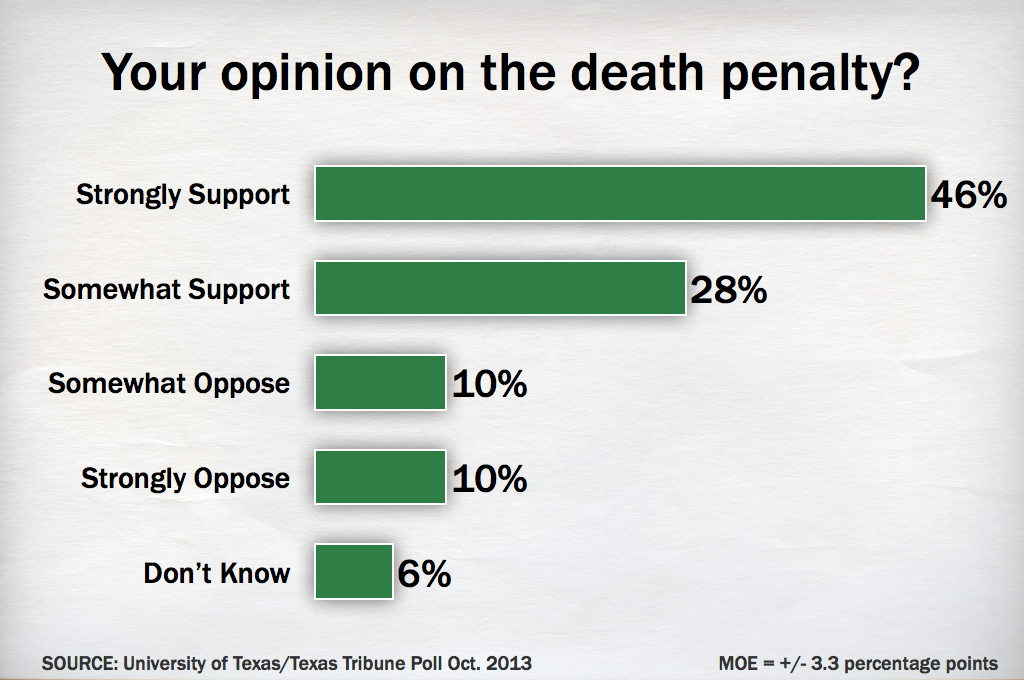UT/TT Poll: Texans Don't Trust Big Institutions When it Comes to Privacy
/https://static.texastribune.org/media/images/2013/11/07/TT-UT-Poll-Day5.481_1.png)
Texans have very little faith that big institutions in the public and private sector will be careful about violating their privacy, according to the University of Texas/Texas Tribune Poll.
At the same time, they continue to support the death penalty even though most believe the state wrongly convicts people in death penalty cases either “occasionally” or “a great deal of the time.”
Federal intelligence and tax agencies are most likely to violate people’s privacy, according to the respondents. Three in five said the National Security Agency is “very likely” to violate privacy rights, followed by the IRS (56 percent), the CIA (54 percent) and the FBI (53 percent). When added to “somewhat likely” responses, the numbers were much higher: 81 percent think the NSA is likely to violate people’s privacy, while 79 percent said the same about the CIA, the FBI and the IRS.
“If you look at the government entities, everyone is worried about government invading their privacy, but Republicans are more suspicious of government than Democrats in the realm of privacy. I think that is a remarkable turnaround,” said Jim Henson, co-director of the poll and head of the Texas Politics Project at the University of Texas at Austin.
“There was a time when trusting government passed to the Republican Party,” he said. “Trusting government was a hallmark of Republican and conservative beliefs, and a wing of the Democratic Party embraced the idea of not trusting the establishment. Democrats still do that, but more Republicans are suspicious now than Democrats.”
Although those are executive agencies, the respondents said the president is slightly less likely than Congress to abuse privacy rights.
The U.S. Supreme Court is seen as less likely to violate your privacy, with only 55 percent saying it was likely to do so and 36 percent saying it was unlikely.
State and local governments are seen as less likely to intrude: 58 percent said Texas state government is likely to violate their privacy, and 65 percent said local police might do that.
“You piece this all together: How is the state economy doing? How is the Legislature vs. Congress? Your local police compared to the CIA or the FBI?” said Daron Shaw, co-director of the poll and a professor of government at UT-Austin. “I don’t know if this is a global statement about us as Texans and trusting things closer to us — if it is simply derived from the general impression that local is great, state is okay and federal sucks. The further you are away from me, the worse you are.”
Among private-sector institutions included in the survey, Texans trust their banks more than they trust their cellphone and internet providers. Banks, in fact, were judged less likely than any public or private-sector institutions to violate privacy, with 51 percent calling it likely and 42 percent saying they are unlikely to do that.
“I think there is a proximity thing here — people are worried about scope and size of government entities and even commercial entities,” Henson said. “Banks have been in the headlines for a lot of things that are not positive, but privacy hasn’t really been one of them.”
The cellphone and internet providers, on the other hand, rank just behind those intelligence and tax entities: More than 70 percent of Texans said those providers were very or somewhat likely to violate their privacy rights.
“The variance across the institutions is interesting,” Shaw said. “My cellphone provider and internet provider are scummy, but they are considerably less scummy than Congress.”
Texans continue to support the death penalty even though most believe the state wrongly convicts people from time to time.
Nearly three-quarters of Texas voters support the death penalty for people convicted of violent crimes, and 46 percent said they strongly support it. Twenty percent oppose the death penalty, half of them strongly.
At the same time, only 2 percent said people are “never” wrongly convicted, another 27 percent said people are “almost never” wrongly convicted, and 49 percent said that “occasionally happens.” About one in eight said wrongful death penalty convictions take place “a great deal of the time.”
The University of Texas/Texas Tribune internet survey of 1,200 registered voters was conducted Oct. 18-27 and has an overall margin of error of +/- 3.3 percentage points. Results among self-identified Republican primary voters carry a margin of error of +/- 5.02 percentage points; among Democratic primary voters, +/- 6.03 percentage points. Numbers in the charts might not add up to 100 percent, because of rounding.
This is the last of six stories on the latest University of Texas/Texas Tribune Poll. Yesterday: Texans' views on immigration.
Texas Tribune donors or members may be quoted or mentioned in our stories, or may be the subject of them. For a complete list of contributors, click here.
Information about the authors
Contributors
Learn about The Texas Tribune’s policies, including our partnership with The Trust Project to increase transparency in news.



/https://static.texastribune.org/media/profiles/ramsey-ross_TT.jpg)